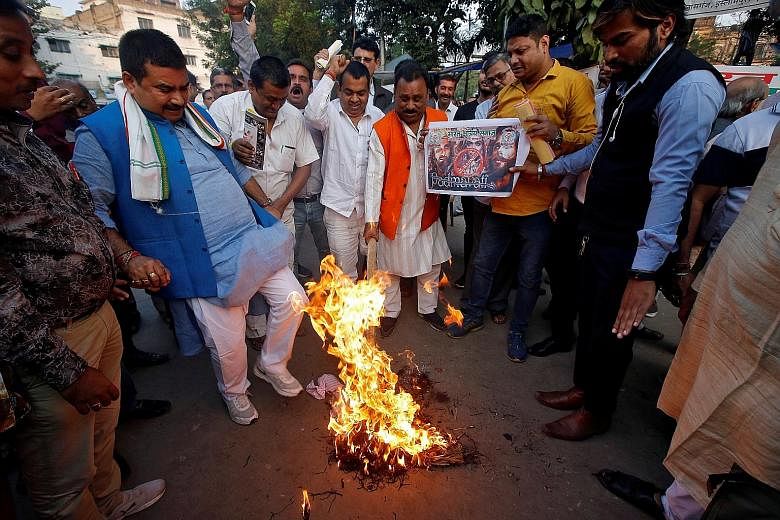In March this year, members of a little known outfit, Sri Rajput Karni Sena (SRKS), broke two mirrors at the Chittorgarh Fort, a Unesco world heritage site in the state of Rajasthan.
Legend had it that Rajput queen Padmavati had asked for the mirrors to be installed to avoid meeting Muslim ruler Alauddin Khilji face to face. But enamoured of the reflection in the mirrors, the Muslim king shortly thereafter launched an attack on the fort. However, the queen chose death by jauhar or self immolation to avoid capture by the invaders.
Padmavati's existence has not been verified historically but she remains a revered figure among the Rajputs, who belong to the warrior caste. Since January, SRKS members have also campaigned against the yet-to-be-released Bollywood movie about the queen. Members have roughed up renowned director Sanjay Leela Bhansali, and issued a threat to cut off the nose of superstar Deepika Padukone, who plays the lead role. They have also vandalised the movie set and theaters.
The director dismissed rumours of a romantic scene between the Hindu queen and Muslim king in the movie to no avail and, as the controversy intensified, producers put off the Dec 1 date indefinitely.
"We don't raise our hand against women. It (the cutting of nose threat) is a matter of speech," said Mr Shakti Singh Bandikui, national convenor of the SRKS which was set up in 2006 to defend the rights of the Rajput caste. "We will not take any disrespect to Rajputs. But we haven't fulfilled our goal. Even if some people see the movie, we would have failed," he said.
The SRKS, which has 700,000 members in 20 states, has drawn support from like-minded right-wingers, including leaders of the ruling Bharatiya Janata Party (BJP) and groups affiliated to the Rashtriya Swayamsevak Sangh, the ideological backbone of the BJP.

Three BJP-ruled states of Uttar Pradesh, Madhya Pradesh and Rajasthan - keen on retaining support from Rajputs - have banned the movie even before its release. Chief minister of Punjab state Amarinder Singh, who is from the opposition Congress party, has also criticised it.
BJP functionary Suraj Pal Amu offered a bounty of 100 million rupees (S$2.08 million) for the heads of Ms Padukone and Mr Bhansali. But the BJP has distanced itself, saying it did not condone violence.
The Padmavati protests have raised questions about artistic freedom and raised concerns about fringe groups emboldened by the BJP, which swept into office in 2014.
BJP leader and Prime Minister Narendra Modi promised to modernise India and push economic growth when he took office. Yet fringe groups and controversial statements from his party members have continued to haunt him.
"If every fringe group decides we are going to frame the boundaries, there is no end to it,'' said Dr Sandeep Shastri, Pro Vice Chancellor of the Jain University, who noted that dealing with these fringe groups was a challenge for Mr Modi. "The Prime Minister is trying to build an image of selling India globally and you have others within the party and front organisations making statements which take India back to the 16th century."
The BJP has denied it is encouraging these groups, though itis generally agreed that they are more active now. Said Delhi University political science professor Bidyut Chakrabarty: "In India, politics is largely governed by emotional issues. BJP front organisations have found an easy route... By raising issues like Padmavati, they are trying to mobilise opinion and support."
Vigilante groups with different agenda
India has a plethora of fringe and right-wing groups.
Among them are dozens of cow vigilante groups which have been very active throughout the country since 2014 after the landslide victory of the Bharatiya Janata Party (BJP) in the federal election.
Prime Minister Narendra Modi has condemned vigilantes who have mostly targeted those in the meat trade, mainly Muslims, who make up about 14 per cent of the population and Dalits, who belong to the lowest caste and usually are involved in the leather industry.
At least 10 Muslims have been killed due to cow vigilantism since 2014, according to Human Rights Watch. Hindus revere the cow.
Other right-wing groups have been vocal about setting up an exclusively Hindu state. Hindu Janajagruti Samiti, set up in 2002, held a convention in July to push its agenda of turning India into a "Hindu rashtra" or Hindu nation.
Another outfit in the news is the Hindu Yuva Vahini, which was founded by Uttar Pradesh Chief Minister Yogi Adityanath. A Hindu Yuva Vahini leader was recently quoted in the Indian media as saying that there was a conspiracy by the Muslim community to make India an Islamic nation by 2027.

